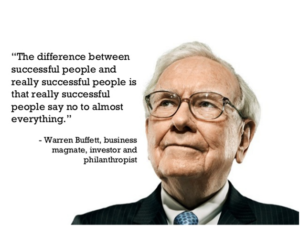Tag Archive for: setting boundaries
“Um, NO, I think not, well, maybe not, um, OK, not right now, that is of course….unless you really need me to.”
How good are you at saying “No?”
The word “no” is truly a hard word to remember and to use effectively. Need more control over your time and your day? There are so many time management tools out there including prioritized lists, calendars, daytimers, Franklin Covey Timers, Outlook, etc. etc.…all in an attempt to get more done every day.
Yet sometimes, you can free things up considerably by just saying the magic word, “No.”
Consider this quote by Tony Blair, former Prime Minister of England: “The art of leadership is saying no, not saying yes. It is very easy to say yes.”
Where do you draw your boundaries?
Boundaries can disappear in our lives for several reasons:
1. I can’t possibly say no to _______________. There are certain people or situations in our lives that are especially difficult to say no to. It could be your boss, your parents, your children, your friends.
2. You may have people around you who are skilled at getting you to do what they want you to. They don’t mean any harm…they just want to take up your time with their needs and requests and know exactly which of your buttons to push.
3. You want to please people.
4. You feel validated or needed through requests of your time.
5. You would feel so guilty (similar to number 1) if you said no.
6. You think it’s a part of your job to never say no.
7. As Tony Blair stated above…it’s just easier to say yes and let your boundaries be crossed than to say no and deal with the fallout from that…negative reactions from others or yourself.
If you recognized yourself in any of these statements, then your boundaries may need a little tune-up to understand where they are and how to effectively protect them.
Many times you don’t even realize your boundaries are being crossed, but a sure-fire indication is if you find yourself feeling overwhelmed, or resenting what you’re doing, or both.
I served on the board of directors for a non-profit. It was a gratifying yet very time-consuming commitment. I was finally forced, with commitments around growing my coaching business to bow out and resign. A few months later, I was asked if I could help with something. I had already said I was done, but they were asking me so persuasively. It took a lot of conviction, but I said I was so sorry and no. Then a few weeks later, I received a beautifully engraved crystal bowl as a thank you for my years of service, with a note asking for my help. This was a huge test. They really needed me!
One of the things I did was to stop and think before I said yes. I realized that there were other capable board members who could step up to the plate as well. It was so difficult, and guilt provoking, but yet again, I had to say no.
I was saying no to protect the prioritization in my work and life. But it takes effort to determine, ahead of time, what is most important in your life. An examination of boundaries can begin there…by prioritizing where and how you want to spend your precious time, guilt-free.
Saying no can mean overcoming guilt. It’s about really examining what your motives are, and deciding the best option for yourself at this time. Saying no means building up security within you that says “I don’t need this acknowledgment; I can do this for myself.” Saying no takes practice, but like all things, it helps to reconsider your goals and priorities before launching into the yes.
If saying no is just too difficult, try this response I once learned from a very wise woman, “My answer is no at this time but if I can, I’ll get back to you.”
ACTION CHALLENGE
What do you need to say NO to, today? How can you constructively look at keeping your boundaries and making informed decisions on what to take on?
Lupe S. Wood, MS, PCC, is a certified Career/Executive Coach. She coaches individuals and leaders to career fulfillment, transition, and advancement. She also consults for results with businesses and solopreneurs. Her background includes 12 years in senior leadership for a Fortune 100 corporation and 7 years as a coach, with a Master’s degree in Organizational Effectiveness and Executive Coaching.
For more information, please visit my website at www.upcoached.com
I was in crunch mode, for sure. I had a busy day at a writing workshop and needed to eliminate distractions and other priorities from taking center stage. At the same time, we had family visitors coming in that evening for a weekend visit and there was still much to do. I had to do it….there was no choice…I humbly asked my husband if he could please prepare the guest room. I needed the help, and to my delighted surprise, he agreed to do it.
When was the last time you really needed help but didn’t ask anyone for it?
In our society, many believe that you must go it alone and not ask for assistance. Or, that it would be faster to do it yourself rather than to train someone else to help. You may also consider that asking for help would reveal a sign of weakness or vulnerability. It can be uncomfortable to show that side of yourself. If I ask for help, then it will look like I can’t handle the job or don’t know my stuff, right? At the office, you’re assigned multiple projects or work assignments that aren’t familiar to you, and instead of asking for support, you tough it out. This can increase a lot of unnecessary stress.
Or, have you ever taken on something really big in your personal life…say organizing the holidays or maybe planning a celebration? You realize as you get into it, that you are overdoing but, since you didn’t ask for the help you needed, you find yourself in exhaustion and overwhelm.
Well, as Dr. Phil would ask, “How’s that working for ya?”
Help is not a bad word…you’re just not used to asking for it upfront. Many times, once you’ve exhausted all solutions, then you ask for help. Well, what if you asked for it before you get into the depths of overwhelm?
Here are a few ways to begin looking at how asking for help can really help you.
- Start with an honest and realistic assessment of the areas where you need some assistance. Where are you trying to do too much on your own? You may be surprised, as I was where help can come from if you only ask.
- Learn the art of delegation. Oh, I could write a whole book on this. Delegation is really a gift to others. You allow others to learn something new or take on greater responsibility. Delegation can be a growth or developmental experience for others and it gets more off of your plate as well.
- Asking for help can build greater trust and teamwork. It will mean so much to the person you’re asking that you trusted them to assist.
- Learn to say NO! (Another book I could write). This action can really help free you up to tackle so many other priorities. One of my favorite phrases that I like to share is when you receive a request, say “Probably not, but if I can do it, I’ll get back to you.” That has helped me many times not to take on just one more thing.
- Take a look at learning opportunities for yourself and give yourself some time to travel that learning curve. As a former technical person, I did some of my best work when I could ask colleagues to review my code or help me to see a problem solution differently. This technique always worked. A fresh set of eyes can find things that you just can’t on your own. Collaborative work areas are perfect for this.
- Understand and accept that you are not “Superman/woman” who has to do all of these things on your own. If your boss is overloading you, it’s because you are a person who gets things done but considers at what cost and whether or not it’s time to honestly assess the situation, reprioritize tasks with your boss, and ask for help.
- Consider professionals. Whatever you need, there’s someone out there to help. As a career/executive coach, I work with my clients to find concrete solutions to overwhelm and prioritized.
- At home, if you’re not a handyman/woman, stop trying to be one! There are professionals out there that can help, and yes you do spend money, but consider the time and aggravation you are spending on your own and make the call.
- Find someone to practice with! A trusted friend or family member can be great at giving you feedback as you master asking for help!
ACTION CHALLENGE
Is it time to ask for some help? Take some time this week to consider where you could use some assistance and reach out using one of the techniques above, or your own.
Lupe S. Wood, MS, PCC, is a certified Career/Executive Coach. She coaches individuals and leaders to career fulfillment, transition, and advancement. She also consults for results with businesses and solopreneurs. Her background includes 12 years in senior leadership for a Fortune 100 corporation and 7 years as a coach, with a Master’s degree in Organizational Effectiveness and Executive Coaching.
For more information, please visit my website at www.upcoached.com



